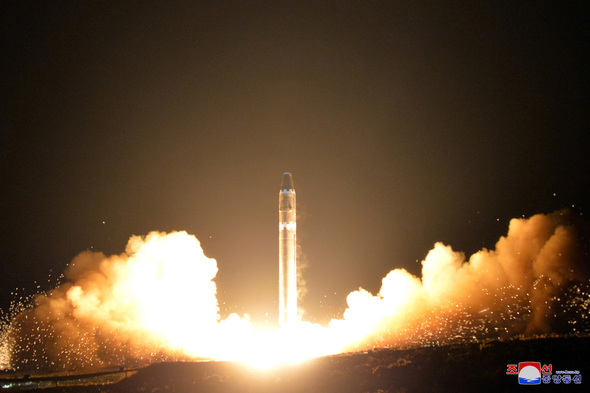 |
|
North Korean Central Television shows footage of the launch of the Hwasong-15 ICBM on Nov. 29. In signing the launch order, North Korean leader Kim Jong-un wrote, “Shoot bravely for your country and the party!”
|
Additional sanctions and maritime interdictions are being voiced as possible responses
The administration of US President Donald Trump is pushing for independent sanctions, a new UN Security Council sanctions resolution, and diplomatic isolation in response to North Korea’s recent intercontinental ballistic missile (ICBM) test launch. Meanwhile, aggressive rhetoric has made a reappearance from Trump and other senior leaders who had been relatively quiet immediately after the launch. Trump planned to announce additional financial sanctions against North Korea as early as Nov. 30, sources reported. US Secretary of State Rex Tillerson said that day that the focus of sanctions would be on “additional financial institutions.” “We have a long list of additional potential sanctions [against North Korea],” Tillerson said. At the UNSC level, the US is pushing for a halt to oil supplies and maritime traffic to North Korea. In a Nov. 28 statement, Tillerson said the US had the “right to interdict maritime traffic transporting goods to and from the D.P.R.K.” In a Nov. 29 briefing with the foreign press, State Department spokesperson Heather Nauert said the specifics of interdicting maritime traffic were still being worked out, but added that it would be “a new level of maritime interdictions.” A senior South Korean administration official explained that this “could mean preventing vessels from traveling to other countries after visiting North Korea, and there was also the Proliferation Security Initiative (PSI) for weapons of mass destruction back in the neocon [the hard-right foreign policy advisors of the George W. Bush administration] era.” “The US doesn’t seem to have a specific plan either,” the official added. On the matter of diplomatic isolation, US Ambassador to the UN Nikki Haley said in an emergency meeting of the UN Security Council that day that all UN member countries “should sever diplomatic relations with North Korea and limit military, scientific, technical, or commercial cooperation.” “We should continue to treat North Korea as the international pariah it has become by taking its UN Rights and Privileges away, including its voting powers,” she added. Provocative rhetoric also made a reappearance. During a speech on his revised tax plan in Missouri that afternoon, Trump referred to North Korean leader Kim Jong-un as a “sick puppy.” Haley stressed that the US has “never sought war with North Korea, and still today we do not seek it,” but added, “If war comes, make no mistake, the North Korean regime will be utterly destroyed.” The remarks were seen as a reminder of Trump’s UN General Assembly speech in September. But with the Trump administration “maximum pressure” policies seemingly hitting a wall, some are calling for negotiation with Pyongyang. “What's needed is a serious diplomatic effort to freeze [North Korean] weapons testing,” stressed US Council on Foreign Relations (CFR) President Richard Haass – an influential figure in US diplomacy circles – in a Nov. 28 contribution to the website Axios. “The Trump administration should make clear what it is willing to offer in exchange for such a freeze, whether sanctions relief, a formal end to the state of war or an adjustment to U.S.–South Korean military exercises,” he added. Ben Cardin, Ed Markey, and other Democratic Party senators released a statement the same day calling for full-scale direct diplomacy with North Korea. By Yi Yong-in, Washington correspondent Please direct questions or comments to [english@hani.co.kr]






